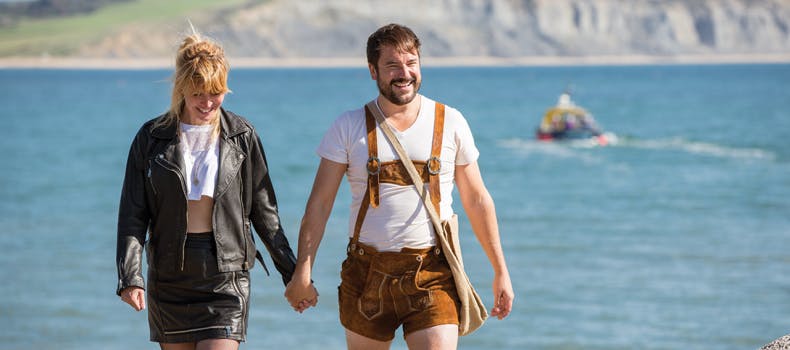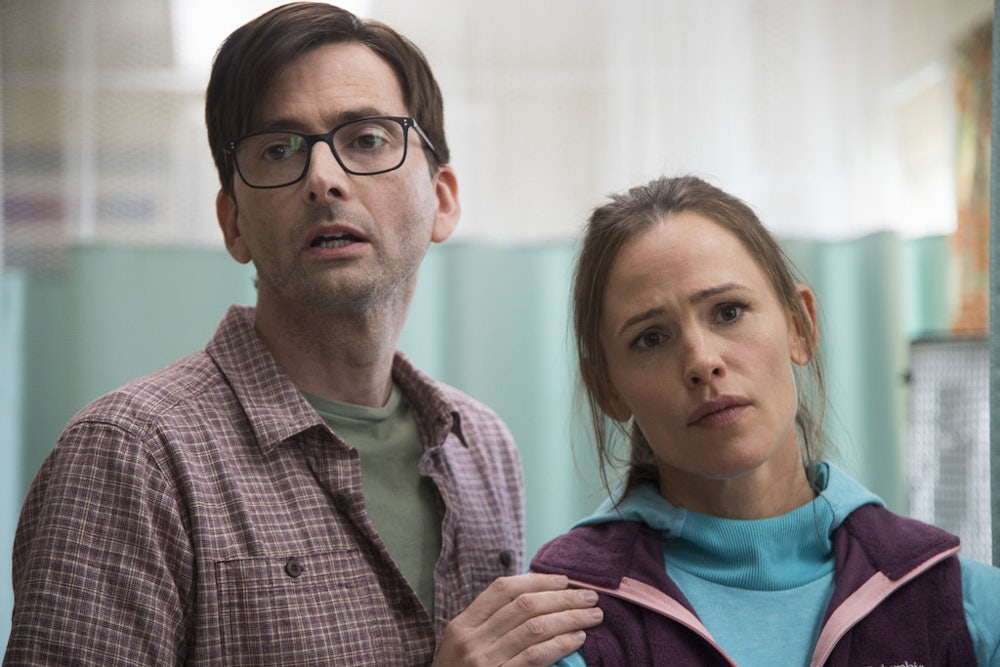If this is what it takes to make Julia Davis a very rich woman, then so be it. The extraordinary writer and actress got her start on British TV in the 1990s, when she sent a character reel to Steve Coogan, who hired her as a writer. The first show she wrote was the BAFTA-winning Nighty Night, a pitch-black comedy about a narcissist (played by Davis) who uses her husband’s cancer to manipulate people around her. In 2016, Davis wrote a six-episode series for Sky Atlantic called Camping, about a starchy monster of a mom who organizes a camping trip for her family and two other couples. That show has now been snapped up by HBO and remade to gleaming American standards by Girls creators Lena Dunham and Jenni Konner.
It’s premiered to some fairly harsh reviews, all of which entirely miss the point. Camping, in its original incarnation, was a vicious satire about a middle-aged harridan who micromanages a trip at a campground run by a deranged mama’s boy. Her browbeaten husband joins her, as well as a son who is forced to wear a special helmet in case he gets injured. Also present is the mother’s pathetic sister, who brings along her boyfriend, a reformed alcoholic widower (his teenager comes with them). The third couple is a recently-separated young man and his brand new girlfriend, a nymphomaniac (played to perfection by Davis herself) who offers everybody speed or ketamine, sometimes mixing them up.
The jokes are blindingly cruel. The alcoholic starts drinking again, provoked by the nympho, and argues with another guy about his dead wife. “She drowned to death!” his friend cries. “Yeah,” he responds. “It’s like, watch where you’re going you stupid cow.” The overprotective mother takes her kid to the hospital after he gets a bump to the head. “I wonder if you wouldn’t mind having a quick look at his anus,” she asks the doctor. “I’m worried that he might have more than one.”
The miniature society of the camping trip totally breaks down. Repulsive sex ensues, along with diabolical mishaps, nudity, violence, and drug benders. The show isn’t so much dark as completely, disorientingly devoid of light.

Dunham and Konner have now remade the show for an American audience that is notoriously thinner-skinned than its British counterpart. It’s interesting to see what they’ve kept and what they’ve discarded. All the basic characters are there, played by a very starry cast: The micromanaging mom is Kathryn (Jennifer Garner). Her downtrodden husband is Walt (David Tennant, playing American). Miguel (Arturo del Puerto) is the newly separated horndog, with Jandice (Juliette Lewis) his boundary-trampling girlfriend. The innocent little sister is Carleen (Ione Skye), and her addict boyfriend is Joe (Chris Sullivan). They’ve added another couple to the mix, in the form of Nina-Joy and George (Janicza Bravo and Brett Gelman), to be foils to the other couples’ bad behavior.
The central change is that Dunham and Konner have imbued each character with a sympathetic twist. Kathryn still micromanages—forcing everybody to go bird-watching, for example—but now she’s a woman stricken by grief over her hysterectomy, her emotional dysfunction sublimated into worries over her body (echoing Dunham’s own medical woes). The brainless and nasty alcoholic of the British Camping has become a sweet, struggling guy who is just trying to find his way. Miguel the shagger is now a smart doctor finding a new light in his life, instead of a pathetic young Englishman who got hair plugs and speaks with a slight American accent.
Crucially, the girlfriend who shows up out of the blue to destabilize the group is now a toxic Reiki healer, rather than Davis’s dubstep DJ. In the original, Fay (Davis) is an irredeemable nightmare. In the new show, Juliette Lewis as Jandice gives us a character who is equally maddening but also charming. In this show, her oversteps sometimes really do liberate the uptight campers around her. She convinces Carleen to cut her hair, for example, and Carleen loves it. Lewis is by far the best actor in the cast, and she certainly has the best role to play with. She gets to be outlandish, horrible, and gorgeous, then flounce off into the fields aglow with hippie self-righteousness.
All these changes are more than acceptable. There is nothing on American television with the vinegar of the original Camping, and to my great sadness there probably will never be. Dunham and Konner’s light touch has allowed them to keep huge chunks of the original script. In fact, many of the jokes are exactly the same. “Velcome to ze camps!” both dads joke, to their wives’ chagrin. We are still allowed to hate everybody, just in lesser doses.
Sadly, the writers cut the best joke of the original script. The mother in the U.K. show won’t let her son eat sun-dried tomatoes, or mozzarella, or wraps, because she fears they will make him “a homosexual.” “They’ve found a link,” she spits, referring to some kind of imaginary science. Making the tyrannical mom into a homophobe is the perfect detail, an evil cherry on top of a very evil cake. The cut is symptomatic of the new show’s agenda: We can’t have Kathryn hate gay people if she is to be ultimately redeemable. We’ve got to keep the hope alive, or nobody will keep watching.
Almost every major review in the U.S. so far has bemoaned the painfulness of the Camping experience. In The New York Times, James Poniewozik lamented that “Camping could be a cutting social satire. ... But it’s hard to see past the harsh filter.” At Variety, Caroline Framke wrote that “the series wastes its potential, showing so little insight or movement that watching Camping becomes nearly as unpleasant as it is for the characters living through it.”
But great satire is meant to be unpleasant. It’s supposed to make your soul feel the way your mouth does when it fills with bile. When you have that feeling and then you laugh, it has the taste of truth. The new Camping has had some of the old force taken out of its swing, but now and then it delivers a real, live uppercut. A show like this should be a tussle: between viewer and character, between love and hate, between enjoyment and pain. Camping could be nastier still, but at least the fight is there.
